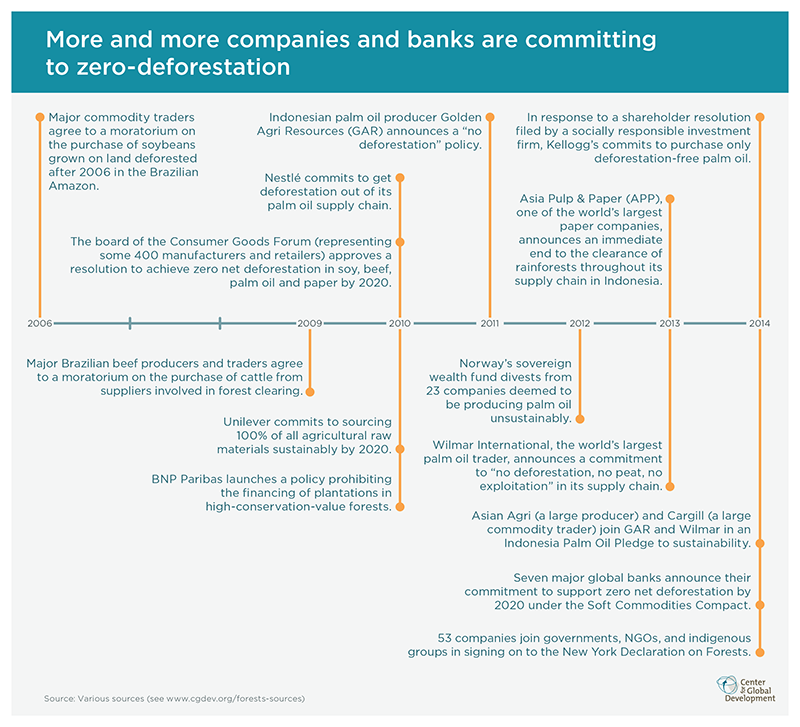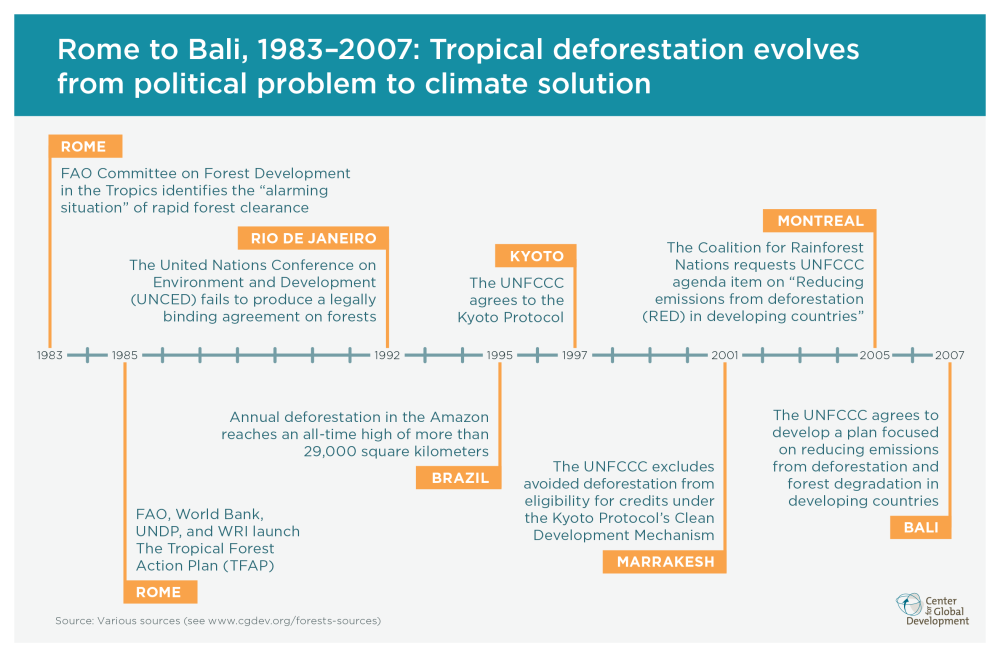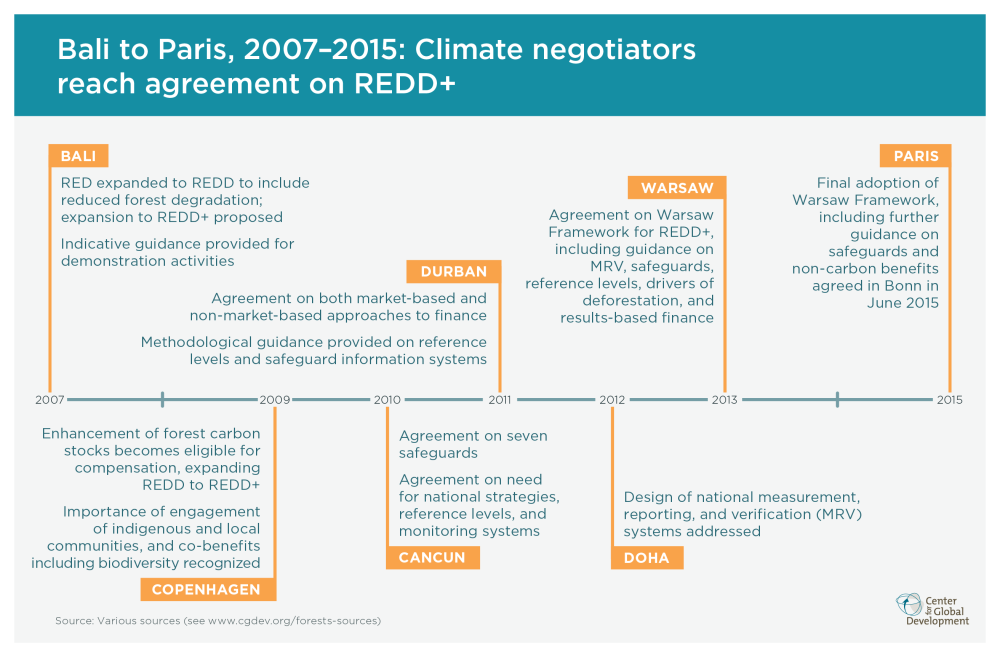
Selected “no deforestation” commitments by supply chain actors and financiers
2006 – Major commodity traders agree to a moratorium on the purchase of soybeans grown on land deforested after 2006 in the Brazilian Amazon.[1]
2009 – Major Brazilian beef producers and traders agree to a moratorium on the purchase of cattle from suppliers involved in forest clearing.[2]
2010 – Nestlé commits to get deforestation out of its palm oil supply chain.[3]
2010 – The board of the Consumer Goods Forum (representing some 400 manufacturers and retailers) approves a resolution to achieve zero net deforestation in soy, beef, palm oil and paper by 2020.[4]
2010 – Unilever commits to sourcing 100% of all agricultural raw materials sustainably by 2020.[5]
2010 – BNP Paribas launches a policy prohibiting the financing of plantations in high-conservation-value forests.[6]
2011 – Indonesian palm oil producer Golden Agri Resources (GAR) announces a “no deforestation” policy.[7]
2012 – Norway’s sovereign wealth fund divests from 23 companies deemed to be producing palm oil unsustainably.[8]
2013 - Asia Pulp & Paper (APP), one of the world’s largest paper companies, announces an immediate end to the clearance of rainforests throughout its supply chain in Indonesia.[9]
2013 – Wilmar International, the world’s largest palm oil trader, announces a commitment to “no deforestation, no peat, no exploitation” in its supply chain.[10]
2014 – In response to a shareholder resolution filed by a socially responsible investment firm, Kellogg’s commits to purchase only deforestation-free palm oil.[11]
2014 – Asian Agri (a large producer) and Cargill (a large commodity trader) join GAR and Wilmar in an Indonesia Palm Oil Pledge to sustainability.[12]
2014 – Seven major global banks announce their commitment to support zero net deforestation by 2020 under the Soft Commodities Compact.[13]
2014 – 53 companies join governments, NGOs, and indigenous groups in signing on to the New York Declaration on Forests.[14]

Rome to Bali: Timeline of international events 1983 – 2007
1983 - Rome: FAO Committee on Forest Development in the Tropics identifies the “alarming situation” of rapid forest clearance[15]
1985- Rome: FAO, World Bank, UNDP, and WRI launch The Tropical Forest Action Plan (TFAP)[16]
1992 - Rio De Janeiro: The United Nations Conference on Environment and Development (UNCED) fails to produce a legally-binding agreement on forests[17]
1995 - Brazil: Annual deforestation in the Amazon reaches an all-time high of more than 29,000 square kilometers.[18]
1997 - Kyoto: The UNFCCC concludes the Kyoto Protocol[19]
2001 - Marrakesh: The Marrakesh Accord excludes avoided deforestation from eligibility for credits under the Clean Development Mechanism[20]
2005 - Montreal: The Coalition for Rainforest Nations requests agenda item on ‘Reducing emissions from deforestation [RED] in developing countries” at the COP 11[21]
2007 - Bali: COP 13 agrees to develop a plan focused on “policy approaches and positives incentives on issues related to reducing emissions from deforestation and forest degradation in developing countries.”[22]

Bali to Warsaw: REDD+ negotiations 2007-2015
2007 - Bali: COP13 expands scope of RED to REDD to include avoided forest degradation[23]
2009 - Copenhagen: COP15 recognizes need for engagement of indigenous peoples and local communities and the importance of co-benefits, including biodiversity [24]
2010 - Cancun: COP16 agrees on seven safeguards, and that countries participating in REDD+ should develop national strategies or action plans, forest reference emission levels, and systems for forest monitoring and providing information on how safeguards are being addressed [25]
2011 - Durban: COP17 finalizes decision to expand REDD to REDD+ to include enhance forest carbon stocks[26]
2012 - Doha: COP18 addresses the design of national measurement, reporting and verification (MRV) systems [27]
2013 - Warsaw: COP19 finalizes the “Warsaw Framework for REDD+”, including guidance on MRV, safeguards, forest reference emission levels, and drivers of deforestation[28]
2015 - Final adoption of Warsaw Framework, including further guidance on safeguards and non-carbon benefits agreed in Bonn in June 2015. [29]
[1] H. K. Gibbs et al., "Brazil's Soy Moratorium," Science 347, no. 6220 (2015): 377-378.
[2] R. Butler, “Brazilian Beef Giants Agree to Moratorium on Amazon Deforestation,” Mongabay.com, October 10, 2009, http://news.mongabay.com/2009/10/brazilian-beef-giants-agree-to-moratorium-on-amazon-deforestation/.
[3] Nestlé, “Nestlé Committed to Traceable Sustainable Palm Oil to Ensure No-Deforestation,” Nestlé.com, October 30, 2012, http://www.nestle.com/media/Statements/Update-on-deforestation-and-palm-oil.
[4] Consumer Goods Forum, “Deforestation,” updated 2015, http://www.theconsumergoodsforum.com/sustainability-strategic-focus/climate-change/deforestation.
[5] Unilever, “The Unilever Sustainable Living Plan,” updated 2016, http://www.unilever.com/sustainable-living/the-sustainable-living-plan/.
[6] BNP Paribas, “Corporate Social Responsibility: Sector Policy- Palm Oil,” March 2012, https://group.bnpparibas/uploads/file/csr_sector_policy_palm_oil.pdf.
[7]Golden Agri-Resources, “Golden Agri Declares Strong Commitment to the New York Declaration on Forests at the UN Climate Summit 2014,” Press release, September 23, 2014, http://www.goldenagri.com.sg/pdfs/SGX%20Filings/2014/Press%20Release%20-%20Golden%20Agri%20Declares%20Strong%20Commitment%20to%20the%20New%20York....
[8] Norges Bank Investment Fund, “Government Pension Fund Global: Annual Report,” February 27, 2013, https://www.nbim.no/globalassets/reports/2012/annual-report/annual-report-2012.pdf.
[9]Asia Pulp and Paper, “Asia Pulp & Paper Group (APP) Commits to an Immediate Halt to All Natural Forest Clearance,” February 5, 2013, https://www.asiapulppaper.com/news-media/press-releases/asia-pulp-paper-group-app-commits-immediate-halt-all-natural-forest.
[10] Wilmar, “No Deforestation, No Peat, No Exploitation Policy,” December 5, 2013, http://www.wilmar-international.com/wp-content/uploads/2012/11/No-Deforestation-No-Peat-No-Exploitation-Policy.pdf.
[11] Kelloggs, “Kellogg Announces Global Commitment to Fully Traceable Sourcing of Palm Oil,” February 14, 2014, http://newsroom.kelloggcompany.com/2014-02-14-Kellogg-Announces-Global-Commitment-To-Fully-Traceable-Sourcing-Of-Palm-Oil.
[12] Golden Agri Resources (GAR), Wilmar, Cargill and Asian Agri, “Indonesia Palm Oil Pledge,” September 24, 2014, http://awsassets.wwf.or.id/downloads/indonesia_palm_oil_pledge_in_un_climate_summit_ny_240914_final.pdf.
[13] World Wide Fund for Nature, “Global Banks Sign Zero Net Deforestation Compact with Clients,” June 26, 2014, http://wwf.panda.org/?224330/Global-Banks-Sign-Zero-Net-Deforestation-Compact-with-Clients.
[14] Press Association, “UN Climate Summit Pledges to Halt the Loss of Natural Forests by 2030,” The Guardian, September 23, 2014, http://www.theguardian.com/environment/2014/sep/23/un-climate-summit-pledge-forests-new-york-declaration.
[15] FAO, Committee on Forest Development in the Tropics. Tropical Forestry Action Plan. Rome: 1985.
[16] A.G.M. La Viña and A. de Leon, “Two Global Challenges, One Solution: International Cooperation to Combat Climate Change and Tropical Deforestation,” CGD Working Paper 388, Center for Global Development, Washington DC, 2014, /publication/two-global-challenges-one-solution-international-cooperation-combat-climate-change-and.
[17] Ibid.
[18] S. Abranches, “The Political Economy of Deforestation in Brazil and Payment-for-Performance Finance,”
CGD Background Paper, Center for Global Development, Washington, DC, 2014, /sites/default/files/CGDClimate-Forest-Paper-Series-10-Abranches-Deforestation-Brazil_0.pdf.
[19] A.G.M. La Viña and A. de Leon, “Two Global Challenges, One Solution: International Cooperation to Combat Climate Change and Tropical Deforestation,” CGD Working Paper 388, Center for Global Development, Washington DC, 2014, /publication/two-global-challenges-one-solution-international-cooperation-combat-climate-change-and.
[20] United Nations Framework Convention on Climate Change, “Report of the Conference of the Parties on its Seventh Session,” Marrakesh, Morocco, October 29-November 10, 2001, http://unfccc.int/resource/docs/cop7/13a01.pdf.
[21] United Nations Framework Convention on Climate Change Report of the Conference of the Parties serving as the meeting of the Parties to the Kyoto Protocol on its first session,” Montreal, Canada, November 28- December 10, 2005, http://unfccc.int/resource/docs/2005/cmp1/eng/08a01.pdf; V. Holloway and E. Giandomenic, "The History of REDD Policy," Carbon Planet White Paper, Adelaide, Australia, 2009
[22] United Nations Framework Convention on Climate Change, “Report of the Conference of the Parties on Its Thirteenth Session, Held in Bali from 3 to 15 December 2007,” Bali, Indonesia, December 3-15, 2007, http://unfccc.int/resource/docs/2007/cop13/eng/06a01.pdf.
[23] United Nations Framework Convention on Climate Change, “Decision 2/CP13. Reducing Emissions from Deforestation in Development Countries: Approaches to Stimulate Action,” Bali, Indonesia, March 14, 2008, http://unfccc.int/resource/docs/2007/cop13/eng/06a01.pdf#page=8.
[24] United Nations Framework Convention on Climate Change, “Report of the Conference of the Parties on its fifteenth session, held in Copenhagen from 7 to 19 December 2009,” Copenhagen, Denmark, December 7-19, 2009, http://unfccc.int/resource/docs/2009/cop15/eng/11a01.pdf.
[25] United Nations Framework Convention on Climate Change, “Appendix 1: Guidance and Safeguards for Policy Approaches and Positive Incentives on Issues Relating to Reducing Emissions From Deforestation and Forest Degradation in Developing Countries; and the Role of Conservation, Sustainable Management of Forests and Enhancement of Forest Carbon Stocks in Developing Countries,” in “Report of the Conference of the Parties on its sixteenth session, held in Cancun from 29 November to 10 December 2010,” Cancun, Mexico, November 29-December 10, 2010, http://unfccc.int/resource/docs/2010/cop16/eng/07a01.pdf.
[26] United Nations Framework Convention on Climate Change, “Report of the Conference of the Parties on its sixteenth session, held in Cancun from 29 November to 10 December 2010,” Durban, South Africa, November 29-December 10, 2010, http://unfccc.int/resource/docs/2010/cop16/eng/07a01.pdf.
[27] United Nations Framework Convention on Climate Change, “Report of the Conference of the Parties on its eighteenth session, held in Doha from 26 November to 8 December 2012,” Doha, Qatar, November 26-December 8, 2012, http://unfccc.int/resource/docs/2012/cop18/eng/08a01.pdf.
[28] United Nations Framework Convention on Climate Change, “Warsaw Framework for REDD-plus,” Warsaw, Poland, November 2012, http://unfccc.int/land_use_and_climate_change/redd/items/8180.php.
[29] United Nations Framework Convention on Climate Change, “Report of the Conference of the Parties on its twenty-first session, held in Paris from 30 November to 13 December 2015,” Paris, France, November 30-December 13, 2015, http://unfccc.int/resource/docs/2015/cop21/eng/10a01.pdf.

